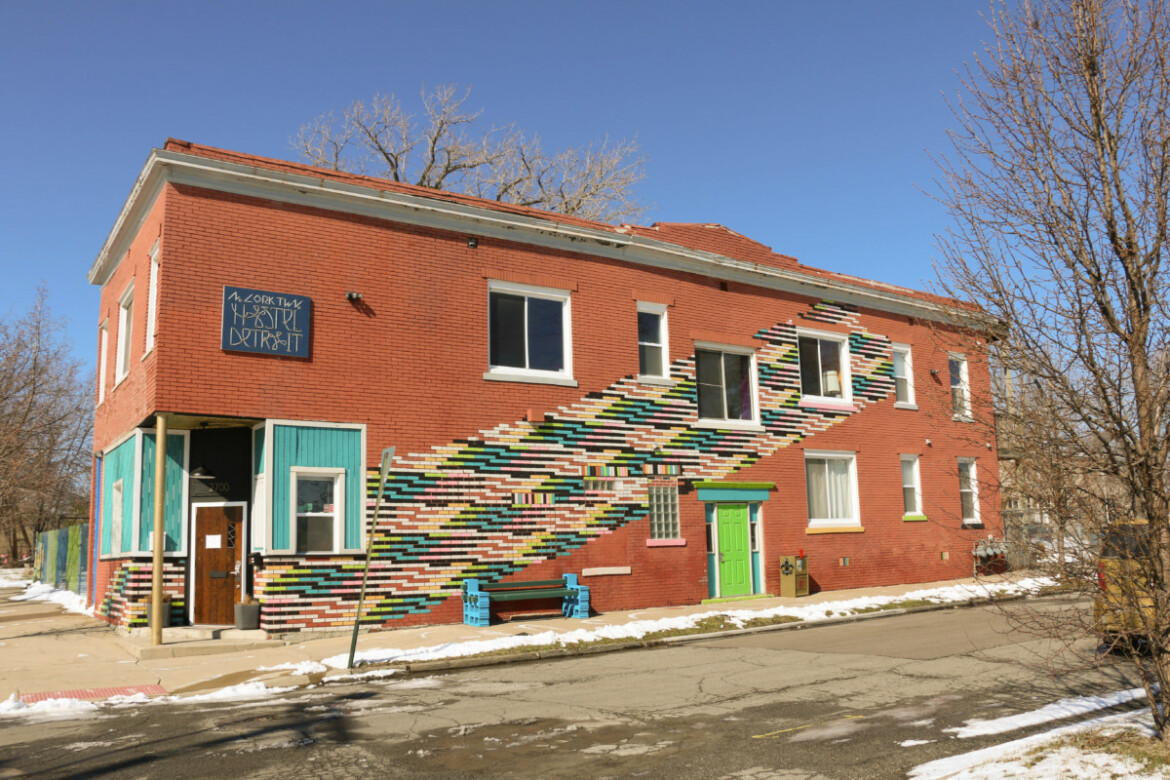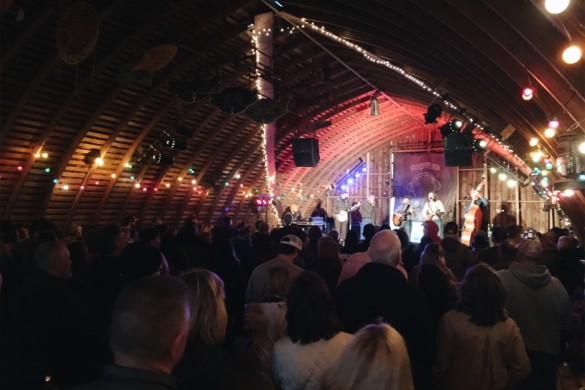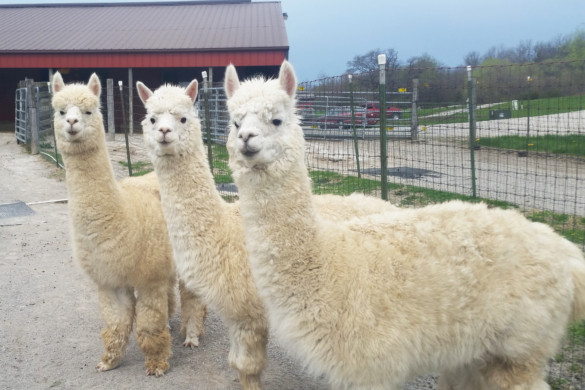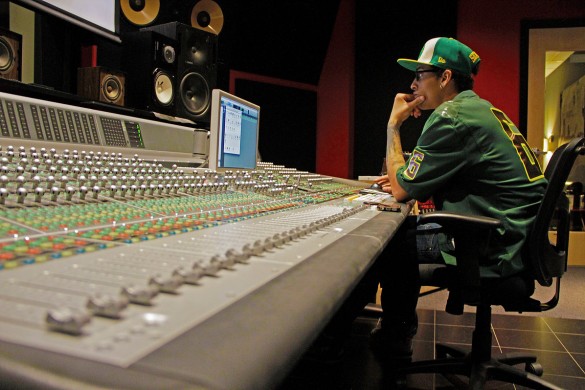Finding a hostel in the flyover states is almost as difficult as predicting the weather — but it’s worth the search
Words and Photos by Angela Ufheil
It’s impossible to miss Hostel Detroit. A diagonal strip of bricks on the building’s front bears neon paint. Another wall is covered in painted faces, each with striking blue eyes that stare down approaching visitors. It’s a far cry from the Hampton Inns my mother booked during family vacations when I was a kid.
Like a lot of people from the U.S., I’ve never stayed in a hostel. I know they’re common in Europe and Asia. But I just got my passport last year, and I’ve yet to put it to good use. Even my world-traveler friends admit that they’ve only “done the hostel thing” outside the United States.
Midwesterners are particularly separated from hostel culture. A quick search on hostelworld.com reveals fewer than 20 in the flyover states. Ten are in Chicago. I search for hostels by city and only manage to find a handful more. Many of them are only open in the summer.
So it’s hardly a Midwestern girl’s fault that hostels are outside her realm of experience. But I hope to travel in the near future, and I’ll likely be making use of dormitory-style rooms during those exploits. It seemed wise to try the hostel life when I’m still in a familiar country, so I booked two nights at Hostel Detroit. It’s the only one in the Motor City.
It would be cheesy to say that a travel experience changed my life. But my first stay in a hostel definitely altered the way I’ll be vacationing from now on. Listen up, fellow Midwesterners: We’re missing out. Here’s why.
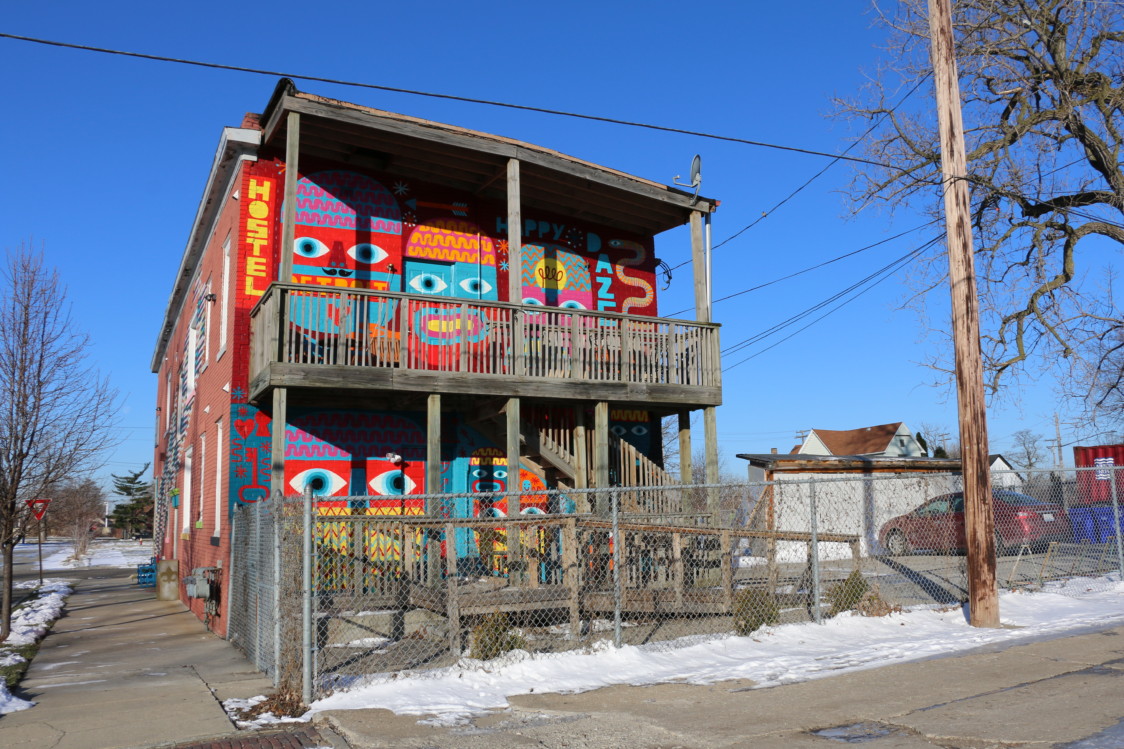
The Hostel Detroit building is nearly one hundred years old. In former lives, it was a shoe store, a Levi’s store and a four-unit apartment complex.
A Tailor-Made Travel Experience
Zach Fairchild, co-director at Hostel Detroit, stayed in his fair share of dormitories during trips in Asia and Europe. He fell in love with the hostel scene overseas. “Hostels get you based on the ground in a new city, and they usually provide resources that allow you to better experience that city,” Fairchild said.
Fairchild could be Detroit’s biggest hype-man. He grew up there, and when he landed back in his hometown as an adult, he knew he wanted to give back. During the housing market crash, people left Detroit in waves, turning parts of the city into a ghost-town. Fairchild wanted to change that vibe, and he realized a hostel might be able to help.
Before Hostel Detroit opened, Fairchild said, visitors had two options: a $200-plus hotel downtown, or a seedy motel. Neither offered what Fairchild calls a true Detroit experience. “If you go stay at a chain downtown, it’s a cookie cutter experience,” he said. “You’re going to see what the tourism board wants to send you to.”
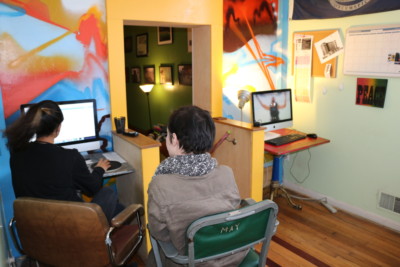
Two part-time staff members hang out in one of Hostel Detroit’s common areas, ready to answer questions. Computer access and free Wi-Fi are available at the hostel.
Not so at Hostel Detroit. The staff has the inside scoop on the city. Like barbecue? Obsessed with techno music? Interested in urban planning? They know where to go, and they’re more than willing to point guests in the right direction. Several volunteers even give walking tours of various parts of Detroit to help newcomers get acquainted.
But Hostel Detroit aims to do more than revitalize the tourism industry. The team wants to help new businesses and entrepreneurs get familiar with the city. They’ve already had some success: The owners of Brooklyn Street Local, a sustainable breakfast and lunch diner that uses local produce, stayed in the hostel while deciding whether or not to open up their restaurant.
Fairchild said others have moved to Detroit after spending time in the hostel and getting more comfortable with the city. “We want to be a resource for people who don’t know anything about Detroit but are interested,” he said. “They can come in and get a local’s perspective on what’s really going on here.”
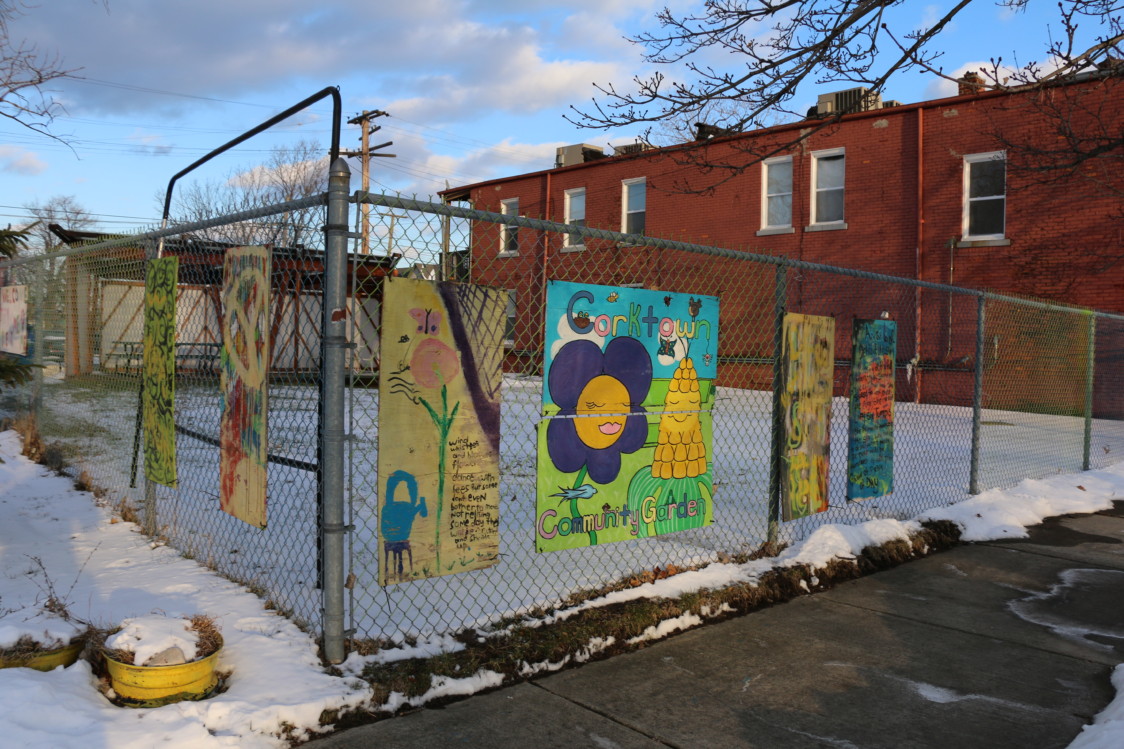
Empty lots in Detroit are being transformed by urban farmers. Behind Hostel Detroit sits a community garden, as well as a fenced-in parking lot where guests can park for an extra $5.
Warm Company
I spent my first night in Hostel Detroit sitting in a sunset-orange kitchen, chatting with a friendly stranger. His name was Oliver Unger, and like me, it was his first time in Detroit. Unlike me, he’s from Berlin, Germany. He’s in the U.S. for a graduate program, and he spent his spring break exploring the Midwest.
Unger was baffled when I started asking him about his experiences in hostels. “I didn’t perceive it as something extraordinary,” he said. “When I was young, my family took me to hostels. Many families do because they have spots all over Germany.”
Unger told me he was surprised there weren’t more hostels in the U.S. I explained that when I traveled as a kid, my parents just always got a hotel. We concluded that hostels in the U.S. just lack the momentum they have in Europe. People like what they’re used to.
Hostel Detroit’s guest list reflects that trend. Fairchild told me that between 60 to 70 percent of the people who stay at the hostel are not from the U.S. “We’re definitely infrastructure for foreign tourists because they expect hostels, whereas Americans in general, it’s not their first choice,” he said.
The diverse group of visitors, though, make hostels prime spots for meeting fascinating people. Unger told me that at the last hostel he stayed in, he met a Somali refugee. And there I was, getting to know a guy from Berlin — who slept in the bunk above me.
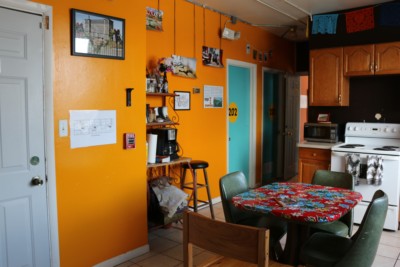
One of three kitchens in Hostel Detroit — the perfect space for meeting other guests from around the world.
Some of those characters can become good friends. Evan Ambrose, the other co-director for Hostel Detroit, made friends with a group staying in a Canadian hostel, and he was later able to stay on one of their couches when visiting Montreal. “You get to meet people, and yeah, hanging out with them when you’re both in the same city, but hopefully you can keep those friendships going. That can lead you to your next adventure,” he said.
I don’t think I built any lasting friendships (no offense, Oliver), but I did enjoy chatting with people I never would have met had we been staying in a hotel and locking ourselves in our rooms at night.
So. Freaking. Affordable.
According to the hotel price index created by Hotels.com, the average hotel room cost $120 per night in 2016. I paid $30 per night at Hostel Detroit, plus an extra $5 per night to park my car in the fenced-in lot.
Over two days, my $70 got me a bed for two nights in a room with ten other people. The hostel staff provided me with a set of sheets, some blankets, a pillow and a towel for the communal bathroom (the building had four, shared between 30 guests). I also had access to a kitchen with a microwave, an oven, a fridge and plenty of cooking utensils.
All this, plus a staff with insider info about Detroit? I could have paid three times the cost per night and still not had access to so many amenities.
Ambrose said the affordability is one of the biggest draws. “Hostels are the perfect way to save money on lodging,” he said. “That’s the whole point of it, to make Detroit affordable and accessible.”
Other hostels around the Midwest have similar deals. The J. Ira and Nicki Harris Family Hostel in Chicago, for example, is $34 per night. The HI Madison is $26-28 per night, depending upon the size of the dorm. The more people staying in a room, the cheaper the price.
Visitors feeling weird about sharing space can pay extra for a private room. Hostel Detroit’s private rooms have one bunkbed and cost $64 per person, so they’re ideal for two people traveling together who still want their own bed.
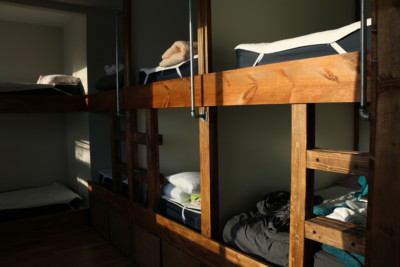
One of the dormitories at Hostel Detroit. When each guest arrives, they choose a bunk and set up with the bedding provided by the hostel staff. At the end of their stay, they simply strip the bed and leave the blankets at the foot of the bed to be washed.
I was worried about the sharing aspect — I love my personal space and quiet time. But my bunk bed was designed almost like a spacious hole in the wall, so once I climbed in, I was insulated from most of the outside light and noise.
Not everyone felt the same. Another guest I met at Hostel Detroit, Shivali Rao, would have preferred a private room. She’s a student at Purdue University in Indiana, and she was in Detroit for a community service trip with several classmates. I asked her how she liked the hostel. “It’s not too different from the dorm lifestyle. But I’m used to having my own space, so it’s kind of weird,” she said.
Rao told me that she’s always traveled with her family. “My dad’s not going to stay in a hostel,” she said. “He’s going to get a hotel room. It’s about comfort, I guess.”
Even though Rao wasn’t completely sold on the hostel concept, it seemed like the affordability might bring her back. “If it’s just me, then I’d stay in a hostel again,” she said. “It’s so cheap.”
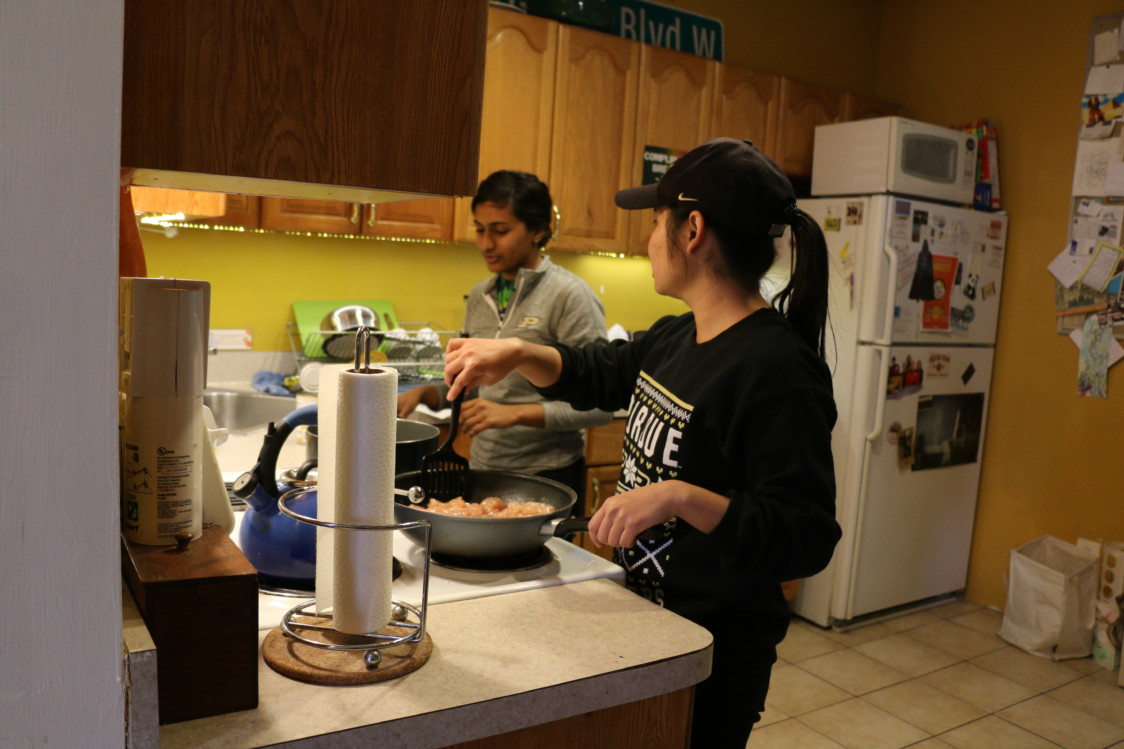
Shivali Rao and a friend from Purdue University prepare a meal in one of the hostel kitchens. Buying groceries instead of eating out each night helps travelers save money.
A Future for Midwestern Hostels
I was a big fan of Hostel Detroit and its combination of fascinating characters and eclectic décor. I’m definitely going to seek out hostels during future adventures — but there may not be many Midwesterners like me.
Hostels have to contend with a multitude of obstacles. Many Midwesterners are still apt to get a hotel room instead. Airbnb, a service that allows people to rent out their homes, is a well-marketed competitor.
Fairchild says the 2005 horror film Hostel has caused problems, too. In the movie, the owners of the hostel allow customers to torture other guests in the basement. The trailer looks gruesome.
“We don’t even have a basement,” Fairchild said with a laugh. “But seriously. It’s done more damage than you’d think a horror movie could do.”
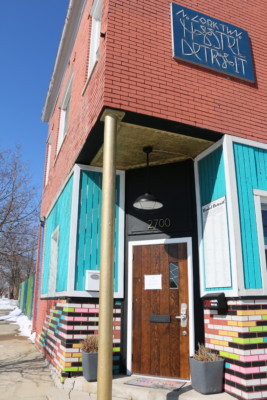
Each paying guest receives a ten-digit code via email that allows them to enter the building. “We try to cultivate a safe space,” Fairchild said. “We have people here 24 hours a day. If someone’s acting weird, we ask them to leave. It’s monitored.
Ambrose backed him up: “I just had a conversation about that movie today.”
At first, the scary movie theory might seem far-fetched, but when you take a group of people who have never stayed in a hostel, and then have them associate the word with grisly murders, it’s not great for attracting Midwestern customers.
But the European customers seem unbothered by the connotation, and they’re bringing in enough money to allow Hostel Detroit to improve the building. The room I stayed in was built by volunteers just a few months ago, and the building is supposed to get a new roof this summer. Updated plumbing is also in the works.
Ambrose told me that another hostel will be opening in Detroit soon, too. I asked him if he was worried about business, and to my surprise, he wasn’t. “I feel like more millennials are traveling than generations in the past,” he said. “I think a lot of that comes from the Internet, being more tech savvy, being able to go find those deals. It’s just easier to plan a trip these days.”
I’m not sure if Ambrose’s prediction will apply to all millennials, but it certainly applies to me. Horror movie or no, I’m planning to explore more Midwest hostels — by the time I cross the ocean, I’ll be a pro.

